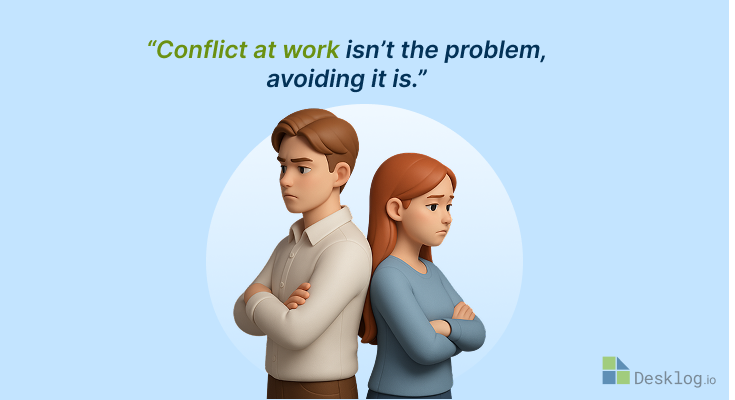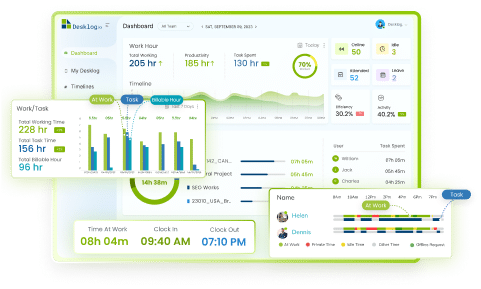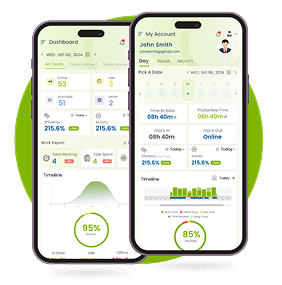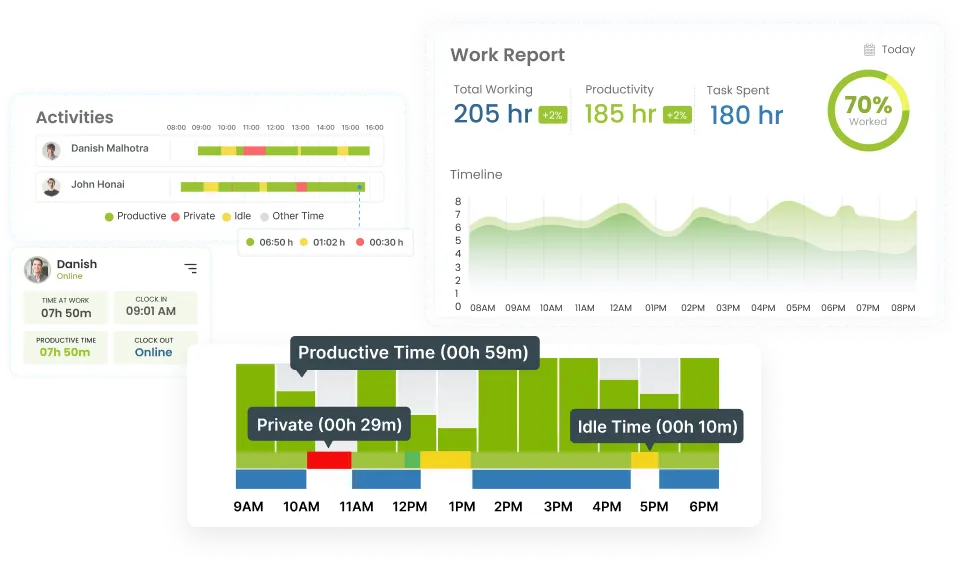Workplace Conflict Isn’t the Enemy…. Silence Is!
What Sparks Most Conflicts at Work?
Workplace conflicts are as common as leftover birthday cake in the fridge and just like that cake, it only gets weirder the longer it sits untouched. Before we can resolve conflict, we need to understand what causes it.

Let’s be honest: workplace tension isn’t just awkward, it’s expensive, time-consuming, and a morale killer. Whether it’s clashing personalities, unclear responsibilities, or the classic Why is this my job again? At the moment, unresolved issues quietly chip away at productivity.
But the solution isn’t more meetings, forced “trust falls,” or pretending everything’s fine. It’s transparent. It’s ownership. It’s systems that replace confusion with clarity.
How to Tame Tension Without a Gong Show
“I love conflict at work!” – said no one ever.

Fun Fact:
According to a study by CPP Inc., 75% of employees deal with workplace conflict and 25% say it has led to absences or resignations.
Let’s be real, workplace conflict is about as welcome as a Zoom call that could’ve been an email. But like leftover curry in the breakroom fridge, conflict shows up whether we like it or not. The good news? It doesn’t have to stink up the entire place.
The data tells a compelling story:
- Only 50% of employees strongly agree they know what’s expected of them at work (Gallup).
- Misaligned responsibilities are one of the top three reasons projects fail (Deloitte).
- Poor communication, including lack of role clarity, causes one-third of project failures (PMI).
These aren’t just inefficiencies, they translate to lost revenue, employee disengagement, and missed deadlines. When employees lack clarity, employee accountability weakens, and performance suffers.
That’s not just awkward. That’s costly.
So, how do we fix it?
This session is your guide to spotting, managing, and transforming conflict no emergency meetings or hall monitor vibes required. And yes, Desklog is your backstage pass to handling it efficiently with clarity, not confrontation.

Role Confusion & Responsibility Overlap
A frequent trigger for internal conflict is unclear roles. When team members aren’t sure who owns what, accountability slips. Tasks either get duplicated or overlooked, leading to frustration and delays. This confusion also affects employee satisfaction, as people feel undervalued or micromanaged in areas they weren’t meant to handle.

Calendar Clashes & Focus Time Interruptions
Unplanned pings, overlapping meetings, and poor team time management can severely impact output. Disruptions during focused work hours contribute to burnout and missed milestones. The more time lost to these workplace distractions, the harder it is to deliver consistent results, no matter how talented the team.

Uneven Workload Distribution
When task assignments aren’t balanced, high performers get overwhelmed while others remain underutilized. This imbalance in workload distribution isn’t just unfair, it’s unsustainable. Over time, it leads to lower engagement, resentment, and a noticeable drop in team efficiency.

Lack of Transparency in Work Hours
In hybrid or remote settings, one of the most subtle yet damaging issues is unclear visibility into when people are working. It breeds doubts and assumptions especially when there are signs of employee absenteeism in the workplace. Transparency in availability and hours helps reinforce trust and prevents misinterpretations from turning into bigger issues.

Ambiguity During Conflict Resolution
Without data, disagreements rely on memory and perception. That’s why addressing issues based solely on feelings often escalates tension. Reliable systems that can measure employee productivity offer objective insights, helping turn heated discussions into constructive ones.

Unclear Contribution to Project Outcomes
When people can’t see how their work impacts the bigger picture, they disengage. A lack of visibility reduces employee engagement and leads to finger-pointing during setbacks. Clear metrics on who contributed what can strengthen team unity and foster ownership.
From Friction to Flow: How to Resolve (and Prevent) Workplace Conflict
Good systems don’t just fix problems, they stop them before they start. Now that we know what causes workplace tension, let’s explore how to handle it gracefully and proactively.
Let Data Cool Things Down
Conflicts fueled by assumptions rarely end well. Desklog provides real-time reporting on time efficiency, subtask completion, and actual vs. estimated hours. With facts in hand, it’s easier to move from emotional reactions to effective resolutions.
Minimize Micromanagement
Hovering over team members doesn’t help, it hurts morale. Desklog offers non-intrusive monitoring tools that encourage employee accountability without making anyone feel watched. You get the oversight you need, and your team keeps their autonomy.
Set Boundaries with Schedules
When does work stop? Without defined limits, stress builds. Desklog’s break & overtime notification system, shift tracking, and idle time monitoring help restore work-life balance, ensuring that personal time doesn’t disappear under the weight of project urgency.
Fix the System, Not Just the People
Recurring issues like overlapping tasks or slow progress? Those are system issues, not personal failures. With Desklog, you can detect early signs of inefficiencies and maximize employee performance before burnout or frustration sets in.
See the Bigger Picture
Late-stage project confusion often stems from poor planning. Desklog’s visibility into individual output and time mapping tools support smarter delegation and resource use, making it easier to prevent project cost overruns and align effort with impact.
Prevent Burnout with Smarter Planning
If you’re seeing increased stress and turnover, it’s time to look at how the team is managing their time. Desklog supports better time management with tools that surface workflow bottlenecks, helping you reduce overload and keep employee burnout at bay.
Proactive Conflict Management for High-Performing Teams
Here’s how to bring lasting clarity to your team and improve employee satisfaction:

Catch the Clash Before It Boils Over
Conflicts usually start with small signals, missed updates, blurred responsibilities, or overlapping assignments not shouting matches. By using Desklog’s Project Time Tracking and Subtask Management, teams can detect these early red flags before they escalate. Managers gain real-time visibility into task progress and ownership, helping to prevent confusion and unnecessary friction. This proactive clarity eliminates the all-too-common “I thought you were handling that” misunderstandings.
Fight Feelings with Facts
Ambiguity is often the spark behind workplace tension, and the quickest way to defuse it is with transparency. With Desklog’s Activity Tracking, you can rely on factual data instead of opinions or assumptions. Detailed logs of work activity, such as app usage, keyboard/mouse behavior, and optional screenshots, turn emotional conversations into grounded discussions. By shifting from hearsay to hard data, teams communicate more clearly and reduce the likelihood of emotional escalation.
Resolve Without the Fire Drill
When last-minute confrontations erupt over hours worked or attendance discrepancies, it creates stress and damages trust. Desklog’s Automated Timesheets remove the guesswork by capturing work hours, breaks, and leave in the background, offering a real-time view of team activity. This eliminates the need for manual reporting or awkward confrontations, allowing managers to address concerns with confidence and employees to work without constant oversight.
Don’t Let Drama Derail Deep Work
Even when disagreements are unavoidable, distractions don’t have to be. Silent tension can sabotage deep work by breaking focus and introducing unspoken stress. Desklog’s Automated Time Tracking helps teams stay centered by distinguishing between productive and idle time, so work hours are spent efficiently, and personal bandwidth is preserved. With this clarity, teams remain focused, even when emotions are high or collaboration becomes strained.
Prevent Resentment with Fair Loads
Workplace resentment often stems from imbalanced workloads, especially when some team members feel overburdened while others appear underutilized. With Desklog’s Shift management and Leave Management, managers can clearly see who’s available, who’s out, and who might be overloaded. This enables more equitable task distribution and ensures that assignments are aligned with actual capacity, reducing burnout and keeping collaboration healthy and fair.
Clarify Roles Without Clashing
When roles and responsibilities aren’t clearly defined, confusion turns into conflict. Desklog’s Project Profit & Loss Tracker and Role-Based Task Visibility help teams understand who is accountable for what, and how each contribution ties back to project outcomes. This level of visibility reduces finger-pointing and keeps communication focused on solving problems instead of assigning blame, ensuring smoother execution from start to finish.
Keep Clients Out of the Crossfire
Client meetings about billing can easily devolve into tension if there’s no clear record of work done. Desklog’s Project Billing features, whether flat-rate, task-based, or hourly; tie invoicing directly to actual work logs, ensuring accuracy and trust. By tracking billable and non-billable hours in detail, invoices become transparent, disputes are minimized, and payment cycles run smoother, leaving both teams and clients more satisfied.
Ditch the Drama, Get Back to Work!
Tired of endless conflicts that go nowhere? With Desklog, you can simplify tasks and eliminate confusion so your team stays focused, aligned, and productive.
Wrap-Up: From “Ugh” to Upgrade
Workplace conflict is like bad Wi-Fi, when it’s off, everything suffers. But with the right systems, you don’t need more meetings or micromanagement.
You need:- Data over assumptions
- Transparency over tension
- Clarity over chaos
With Desklog, your team can:
Handle conflict like a pro, because healthy teams don’t avoid tough conversations. They manage them like grownups, with tools that make it easier.
















